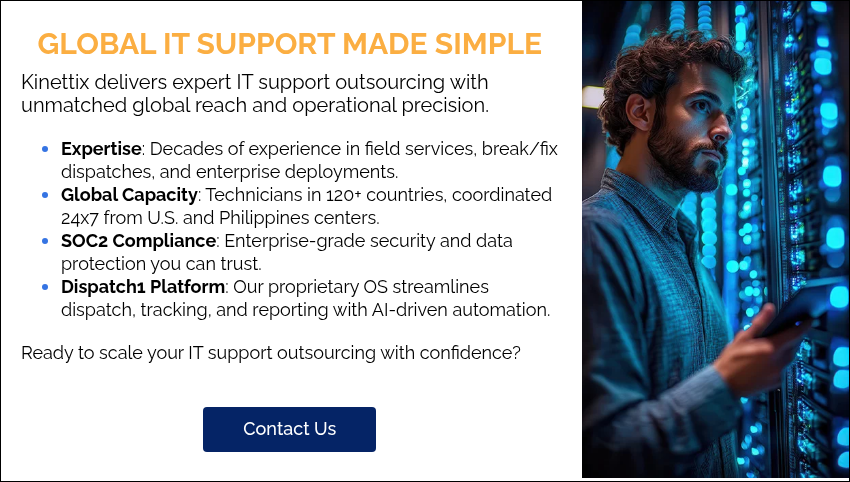As business-critical technologies grow at a seemingly exponential rate, companies are faced with a new challenge. In the past, having an in-house IT team was typically sufficient to handle the installation and maintenance of any IT hardware or software the business used. But recently, three critical things have occurred.
- IT hardware required to run a business has diversified tremendously, making it increasingly difficult to stand up a team with all the skills necessary for installing and maintaining these devices.
- Businesses have become more geographically diverse. Keeping a fully-staffed IT team at one or two, or even a handful of offices, was possible, but businesses now often have dozens of business centers spread all over the country or even the globe. Because of this, single, centralized teams are no longer capable of serving the needs of the company without excessive travel expenses.
- Competitive pressure has made keeping a bench of technicians, who are often underutilized, almost impossible.
In light of these developments, many businesses are increasingly outsourcing their IT Support. Sometimes, this is a complete outsourcing of this task, but more often than not, it is a blending of a smaller IT team that is supplemented by outsourced specialists.
Why Outsource IT Support? 5 Major Benefits
Outsourcing your IT support can be a transformative move for your business, offering a strategic blend of cost-efficiency, scalability, and access to specialized expertise. By partnering with a trusted provider, companies can slash costs, streamline their operations, and allow internal IT leadership to focus on top business priorities. The benefits of outsourcing your IT include:
:
- 24/7 Support: Some IT service providers offer round-the-clock support. This is critical for businesses such as retail stores or restaurants that need service after business hours.
- Cost Savings: Outsourcing IT resources is an extremely effective business strategy. There is no longer a need to pay the salaries, benefits, training, and infrastructure costs of full-time employees. Companies pay only for the services they need and thus change fixed IT expenses into scalable variable costs.
- Access to Expertise: As technologies diversify, so do the skillsets needed to install and maintain them. Outsourcing IT services allows businesses to leverage technicians with the specific skillset and training needed for an IT event rather than relying on the more generalized knowledge of full-time employees.
- Scalability and Flexibility: Whether it is from a major IT upgrade, new construction, or projects for their customers, most businesses have surges in demand for IT services. A standing team of full-time employees doesn’t allow for scale. Capacity remains fixed. But outsourced IT support gives companies the ability to scale up and spin down their IT workforces quickly and efficiently to meet these surges in demand.
. - Access to Global Talent: More and more, we live in a global economy. Whether your company has international offices or your products are being used on a national or global scale, you need a geographically diverse footprint for your IT services. Outsourcing your IT services, especially with a global partner, allows you to get the right tech at the right time in the right place, anywhere in the world.
4 Key Cautions/Watch-Outs to Carefully Consider

Not all outsourced IT service providers are created equal. Unfortunately, choosing the wrong one can lead to severe consequences. Here are some key cautions you need to consider when selecting an IT services provider.
- Data Security Risks: Anytime you pull an outside company in, especially in the realm of IT, there is a risk of a data breach. It is critical to ensure that the outsourced provider has robust security protocols, a track record of security, and signs an NDA..
- Unsatisfactory Results: When you use a third-party vendor, there is always a chance of poor performance. In the IT services industry, in particular, there are fly-by-night operations. These companies spin up and then rapidly go out of business, often leaving their clients without a viable recourse for completing the projects on which they were working. Be sure that you find a reputable, established provider.
- Hidden Costs: Unclear contracts may contain language that opens the door for unexpected expenses for upgrades, support, or change orders. Be sure you receive a detailed contract from a company that has been in business for an extended period of time. Ensure your legal team reviews any and all contracts before signing.
- Compliance and Legal Risks: If your outsourced IT support is being delivered overseas, there are a litany of rules, regulations, and laws that impact the work. If the company you partner with is not familiar with these standards, it can leave you holding the bag for a list of violations and taxes. Be sure to use companies that have experience working in international circumstances in the countries in which you will be doing work.
Searching for the Optimal Support Team? Consider These 5 Qualities of a Perfect Match

When searching for the optimal outsourced IT support team, it's essential to approach the process with clarity and strategy. As we have seen, the right partner can streamline operations, reduce costs, and enhance service delivery—but the wrong one can lead to inefficiencies, security risks, and missed expectations.
- Proven Expertise: The wide diversity of IT projects makes it essential to ensure you find a partner that has expertise in the type of work you need accomplished. Does the provider have technicians with the skillsets you need? Are they experienced in managing the type of projects you need? Have they done work in the vertical in which your company does business?
- Access and Communication: One of the challenges with outsourced IT services providers can be communication. Since they are not on your field service management platform, creating tickets will usually involve tedious swivel seating. Tracking ticket progress and getting quality reports back on work done can be just as cumbersome. Look for a provider that has an API to integrate their system with yours, so you have direct insight into the work being done through your own platform.
- Transparency: Your partner should give you standardized pricing in advance. There should never be any hidden costs. They also need to deliver reporting that enables you to have a very clear picture of the metrics that are important to measuring success, such as tech on-time percentage and first-time fix rate.
- Global Footprint: One of the limiting factors for many companies is the area that their IT team is able to cover when “boots on the ground” are needed. Finding an outsourced IT partner with the ability to give coverage nationally, or even better, globally, can dramatically increase your ability to do business.
- Field Service Coordination: Effective technician coordination and territory assignment are crucial for dispatch-heavy operations. Providers that offer FSM platforms and direct-to-tech models can reduce margin stacking and improve efficiency.
In-House Team Vs. Outsourced IT: Weighing Which Option is Right for Your Business
|
Direct Control & Oversight |
Cost Efficiency |
Access to Diverse Expertise |
Scalability/Flexibility |
Global Footprint |
|
|
In-House |
✅ |
❌ |
❌ |
❌ |
❌ |
|
Outsourced IT |
❌ |
✅ |
✅ |
✅ |
✅ |
The choice between in-house and outsourced IT teams is one that involves a number of factors that need to be carefully weighed by any business.
- The major advantage of in-house teams is that they are under the direct command and control of the business and often have a deep understanding of the various technologies the company uses.
- On the other hand, there is no way for an in-house team to compete with the cost-efficiency of an outsourced provider. Since businesses only pay for the outsourced technicians when they are using them, the cost advantage is almost always significant.
The other advantage of outsourced providers stems from the fact that they have more resources from which to pull. This gives them the ability to provide a greater diversity of skillsets and geographic locations.
Many companies today are leaning more on outsourced technicians or are keeping a small in-house team of highly knowledgeable staff that manage outsourced providers in a hybrid model.
IT Support on the Horizon: 3 Industry Trends that are Changing How Companies Operate
Even in an established industry like IT field services, changes occur at a rapid pace. Here are three trends worth noting:
- Use of AI to Streamline Operations: The IT field service business is one of efficiency. Whoever can deliver a technician or an outcome at a lower price than their competitor, wins business. As a result, leading outsourced IT support companies are leveraging AI to ensure the most efficient means of selecting technicians, tracking tickets, rating technician effectiveness, and improving response time. This use of AI reduces costs and the price of services delivered to their customers.
- Platform-Based Service Delivery: Outsourcing firms are offering integrated platforms with APIs, dashboards, and self-service portals. This eliminates the need for double data entry and improves transparency, reporting, and control over outsourced operations.
- Staff Augmentation: As the technologies required to do business continue to increase, many corporations are leaning on Staff Augmentation as a solution. This delivers short-term skill-specific technicians and engineers who work under the company’s command and control. This allows businesses to supplement their teams for surges in demand without the high expense of other full-time employees.
2 Relevant IT Service Provider Case Studies
Case Study: Drive-Thru Menu Board Support for a Global Fast Food Chain

Client Need:
A digital merchandising solutions provider partnered with a global fast food chain needed a reliable IT field services provider to install, repair, and replace drive-thru menu boards across U.S. locations. The work was unplanned and required rapid response times, minimal downtime, and coordination of both IT technicians and electricians.
Kinettix’s Solution:
Kinettix deployed its proprietary Dispatch1 system to manage ad hoc service requests. The team handled everything from sourcing and briefing technicians and electricians to coordinating logistics like equipment delivery and weather monitoring. A dedicated project coordinator ensured seamless communication with the client’s service desk and documented performance in daily reports.
Outcome:
The client experienced significantly improved service responsiveness and operational efficiency. Kinettix’s ability to manage complex logistics and deliver consistent results earned high praise from the channel partner, solidifying a long-term relationship.
Case Study: Hybrid Cloud Infrastructure Support for a Global Technology Provider
Client Need:
A leading global technology company required on-site technical expertise to support its hybrid cloud infrastructure across multiple international locations. The challenge was to maintain high performance and strict compliance standards while managing complex hardware and network installations.
Kinettix’s Solution:
Kinettix deployed certified, security-cleared technicians to the client’s hybrid cloud sites worldwide. Services included hardware installation, network cabling, MACD (Move/Add/Change/Delete) operations, break/fix support, and preventative maintenance. Kinettix adhered rigorously to the client’s security protocols and compliance requirements.
Outcome:
Kinettix ensured seamless infrastructure performance and minimized downtime across the client’s global operations. Their scalable, secure, and compliant service delivery reinforced the client’s trust in Kinettix as a strategic IT field services partner.
IT Support Services: 5 FAQs for Success
- What is outsourced IT support?
Outsourced IT support refers to a business hiring an external provider to handle some or all of its IT functions. There is a broad range of services that can be included under this umbrella, including staff augmentation, break/fix support, IT rollouts, and network monitoring. - How does the size of a business influence whether or not it should outsource IT support?
In many ways, the question here should be how businesses of different sizes should use outsourced IT services, rather than if they should. Small and medium-sized businesses often rely on advanced technology, but don’t have the resources for a large bench of full-time technicians. Outsourcing can provide the specialized skillset and scale they need to maintain and grow their business. On the other hand, larger companies may already have large, established IT departments, but often turn to outsourced partners to supplement their capabilities, expand their reach globally, and scale for periods of high demand. - How much money does IT support outsourcing actually save? Is it worth the savings?
Outsourcing IT support is almost always a winner in cost-effectiveness, but the savings vary significantly. Overall, businesses can expect a 30 - 50% cost savings compared to hiring, training, and retaining full-time staff. If you are considering this move, it is important to have a detailed list of the specific needs you have so that your outsourced provider can work with you to provide the most cost-effective plan possible. - How do I know if IT outsourcing is right for my business?
Outsourcing is ideal for businesses that want to reduce IT overhead, lack internal expertise, or need flexible support across multiple locations or time zones. Small and mid-sized companies often benefit most from outsourcing, while larger enterprises may use it to supplement internal teams or fill skill gaps. - How quickly can an outsourced IT support provider respond to issues?
Response times vary by provider and service level agreement (SLA), but many outsourced IT support teams offer 24/7 coverage with guaranteed response windows—often within as little as four hours. Be sure to review the SLA terms to ensure they align with your business continuity needs.
Partner With the Pros: How We Make IT Support Outsourcing Simple and Effective in Achieving Your Goals
Kinettix has built a reputation for simplifying outsourced IT support through proven processes, global reach, and a highly skilled team.
Our experts understand the complexities of managing distributed IT operations and bring deep knowledge across industries and technologies. Whether you're scaling into new markets or need consistent support across multiple regions, we deliver reliable, professional service that aligns with your business goals.
Kinettix operates 24/7, ensuring that your IT support needs are met anytime, anywhere. Our global capabilities allow us to deploy technicians and coordinate services across borders with speed and precision. From break/fix support to complex infrastructure rollouts, we provide the flexibility, responsiveness, and expertise that modern businesses demand.
Partnering with us means gaining a trusted ally who is committed to helping you reduce costs, improve service quality, and stay focused on what matters most—growing your business.
For more information, give us a call at +1.888.397.0086 or contact us here.






